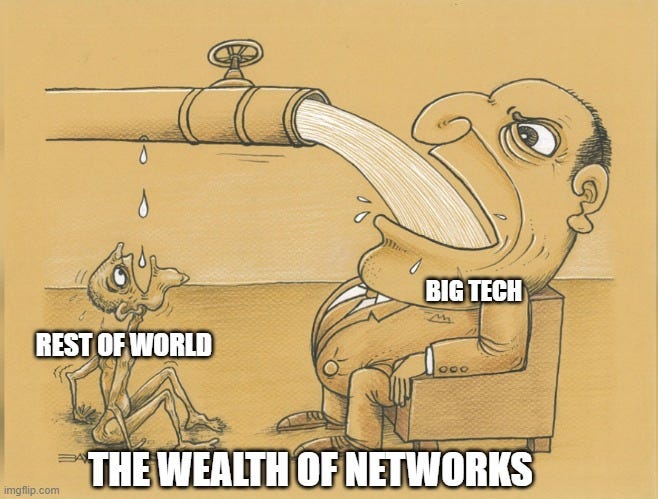The Global Digital Compact is Upon Us: What’s in Store for the 99 percent?
Dear Reader,
As instances of political turmoil have unraveled across the globe, we’ve seen Big Tech’s power implicated repeatedly in the spiraling deterioration of our public sphere. Indeed, this month revealed more of the incendiary and disorienting ways in which giant, unchecked, social media platforms of Silicon Valley have exacerbated this strife.
Elon Musk’s X, for instance, was at the heart of the false rumors that ignited racially charged rioting across the UK, with Musk himself fanning the flames with his interventions. In fact, as recent investigations have shown, Musk’s bluster around ‘championing free speech’ has served as a cynical ploy for settling personal scores, and subverting socio-political ethics, ever since he took over the platform. Perhaps the most flagrant example of this has been the recent feud that the billionaire has initiated against the Brazilian Supreme Court. When a Brazilian judge issued takedown orders against far-right anti-democratic content on X, Musk alleged censorship and proclaimed he was withdrawing the platform’s services altogether. Such display of impunity in the face of a sovereign nation’s juridical processes raises grave concerns about the power that Big Tech holds over our democratic institutions.
The problem is far from restricted to a single platform too. Last year, both Meta and YouTube rolled back their misinformation policies, arguing that they could not ensure the absence of bias, and so, an ‘open’ flow of communication was a fairer environment, particularly in light of the upcoming US elections. However, again, such a posture of ‘openness’ has effectively manifested as cover for the unrestrained biases of those wielding platform power. For example, when it comes to sensitive issues such as the assault on Gaza, or elections in the Global South, there seems to be a very different, and one-sided dispensation in place. Moreover, even in the US, recent reports indicate that the effect of some of these updated policies has been disproportionately felt by activists and progressive accounts.
Ultimately, then, what we have is a series of digital platforms and infrastructures that remain fundamentally centralized and unilateral in their socio-cultural and political influence, yet masquerade as providing a neutral ground for ‘organic’ outcomes to emerge. What makes this possible is the absence of robust governance frameworks, both at the national and the multilateral level.
There is a clear parallel to this situation on the economic side too, albeit the regulatory and juridical wheels seem to be starting to gain a little momentum there. Just this month, there was a landmark ruling at a US district court, which found Google to be illegally maintaining a monopoly on online search. The trial brought out stark details of what unbridled market power makes possible: unilateral price increases, exclusive deals that block channels of distribution for competitors, predatory merger activity, and the bullying of partner firms, along with a litany of other controversial actions (not least of which was destroying sensitive evidence). Some reports suggest that the remedy phase of the trial will even consider radical proposals such as breaking up Google’s different business arms, or mandated data-sharing and interoperability. Of course, Google is likely to appeal, and there may be a long way to go before any concrete intervention. Still, what is heartening is that the bipartisan nature of this case (it was initiated by the Republicans, and taken forward by the Democrats) does point to a growing appetite for instituting some accountability around the digital economy.
Keeping with this theme, August also saw the unveiling of an ‘Agreement on Electronic Commerce’ by the WTO Joint Statement Initiative on E-commerce, after nearly seven years of plurilateral negotiations between 91 countries. This process has been plagued throughout, with many developing nations accusing it of being a trojan horse for dominant corporate interests, as well as questioning its legality. Moreover, with the US pulling out last year, it lost the presence of arguably the most significant strategic actor at the forum. Looking at the details, critical analysis points out, that the global landscape is markedly different now than when this process was initiated in 2017 and the final text is a far cry from solutions to address problems of our current moment. Perhaps, then, what it most clearly signifies is the immense hurdles to robust multilateral governance that continue to haunt the digital sphere, and the inadequacy of institutions like the WTO to do justice to them.
This brings us to this month’s issue of DataSyn. Situated as we are a few weeks from the United Nations’ Summit of the Future, this month we engage with the stakes of the Global Digital Compact (GDC) being negotiated therein. As many of this month’s developments - and indeed the trajectory of our increasingly digitalized world over the last several years - indicate, there is a strong imperative to not squander this opportunity. We must navigate the complexity of international dialogue and political consensus-building required to produce genuine breakthroughs toward overcoming our regulatory abyss. One shouldn’t be lured into narratives of a supposedly democratic order mythologized around the internet’s institutional oversight. The complexity of internet governance and its elite control has only deepened with the infinite public policy issues that the arc of digital social existence has thrown up. What is eminently clear is that without accountable global governance, it is the forces of capital – and not any expression of the public will – that prevail in reality. The GDC negotiations – marked as they are by the predictable contestations around the values and powers that shall determine the future digital society – may still be a worthy forum to mobilize and attempt to thwart this state of affairs.
To this end, our two main features for August are interventions into the substance and debates of the GDC as it currently stands. Our first piece takes stock of the discourse of the GDC as it has evolved, critically examining the distance that has emerged between its avowed goals and the specific types of measures being put forward to achieve them. Supplementing this analysis, our second piece provides a more general picture, bringing together a series of key voices from the Global Digital Justice Forum to briefly reflect on the state of digital justice today and the significance of a process such as the GDC. In addition, we have also included a third piece where we collate some of the key advocacy interventions that were made by IT for Change over the course of the last two years of the GDC process.
Finally, as a bonus feature, we are pleased to announce the launch of a new editorial track. As a periodic sub-section, ‘Experiments In Theory’ will seek to delve into contemporary theoretical debates around the platform economy and its dynamics, surveying ideas and critical analysis from multiple divergent perspectives active today. As our first piece in this track, we bring you an exploration of the ‘Varieties of Capitalism’ approach and what it might look like in the context of digital platforms.
The DataSyn Team
THE BIG EXCESS
The Global Digital Compact: Back-Sliding to a Failed Free-Market Playbook?
Anita Gurumurthy and Nandini Chami
With the final stretch of the process in view, it is crucial to be mindful of persisting problems with the discursive framings that have evolved around the Global Digital Compact. Anita Gurumurthy and Nandini Chami bring a critical lens to bear on this prevailing discourse, highlighting the blind spots that may still hold it back from delivering on its promises.
Read on.
THE NEW DIVERGENCE
The Imperatives of Digital Governance Today
Various Members of the Global Digital Justice Forum
What are the main issues that continue to plague digital governance today? And why is the GDC an important avenue to potentially contest the status quo? We posed these questions to some of the central members of the Global Digital Justice Forum, to get a view from the trenches. Have a look at what they had to say.
Read on.
THE POLICY TABLE
Tracing the Fault Lines: An Advocacy Retrospective
IT for Change
Over the last three years, IT for Change has been deeply engaged with campaigning and advocating around Global Digital Constitutionalism, and the direct GDC process as well. In the hopes of providing insight into the historical trajectory of some of the prevailing discussions, and the underlying stakes for Global South politics, we provide a retrospective archive of some key interventions from this time:
Towards a Global Digital Constitutionalism: A Radical New Agenda for UN75
Global Digital Compact – Linchpin for a Future Multilateralism?
Pragmatic Deal or Tragic Compromise? Reflections on the UN SG’s Policy Brief on the Global Digital Compact
The Global Digital Compact We Need for People and the Planet
EXPERIMENTS IN THEORY
On Global Platforms and Local Capitalisms
Christopher Foster
How do local legal regimes, modes of governance, economic formations, and social institutions affect capitalist dynamics? How might they, by extension, affect the evolution of platforms and digital ecosystems? Most importantly, what would a perspective that foregrounds these questions reveal about today’s landscape that remains obscured to our analytic lenses? Chris Foster critically unpacks these issues and considers the merits of such a theoretical vantage point.
Read on.
The Sins & Synergies Lounge
Need some context on the Global Digital Compact? Look no further than the Digital Watch Observatory’s rich archive of resources, which provides both historical and thematic primers on different facets of this crucial multilateral process. Also, while you’re at it, you might want to tune in to this insightful discussion on the Sunday Show of the Tech Policy press, that sets up the geopolitical stakes and maneuvers that are shaping internet governance’s current trajectories.
Development initiatives helmed by the Global North have always - and often rightly - been met with considerable suspicion by much of the majority world. As these initiatives become increasingly tied to the prospects and potentials of digital technology, it is important to remain vigilant regarding their multiple agendas. Case in point, listen to this short commentary on the U.S. Agency for International Development’s new digital policy that explicitly frames digital development as an instrument for countering China.
In the face of Amazon’s latest dubious claims of having achieved its renewable energy targets seven years ahead of its deadline, be sure to check out the Financial Times and MIT Technology Review’s timely investigations into the creative accounting and lobbying efforts of Big Tech to shape how sustainability analytics are determined.
Also to add to this month’s reading list, is Wall Street Journal reporter Dana Mattioli’s new book, The Everything War: Amazon’s Quest to Own the World and Remake Corporate Power. The work encapsulates one of the most comprehensive investigations into Amazon's ruthless pursuit of market dominance. Bonus: Check out this extensive conversation where Mattioli discusses what it took to report on Amazon’s brutal strategic maneuvers for over a decade and write her book.
In keeping up with the AI space, have a look at this piece by Jason Koebler from 404 Media on a proposed exemption to the Digital Millennium Copyright Act that might make it easier to conduct good-faith, independent reviews of AI systems for bias, training datasets, and harmful outputs. While free scraping of the internet by AI companies for training data has been a matter of concern for a while, this piece offers insights from new research by the Digital Provenance Lab that suggests that the backlash against AI companies has led to a significant drop in content available for training AI models.
Post-script
DataSyn is a free monthly newsletter from IT for Change, featuring content hosted by
Bot Populi. DataSyn is supported through the Fair, Green, and Global Alliance.
Liked what you read? To have such concise and relevant analysis on all things Big Tech delivered to your inbox every month, subscribe to DataSyn!



